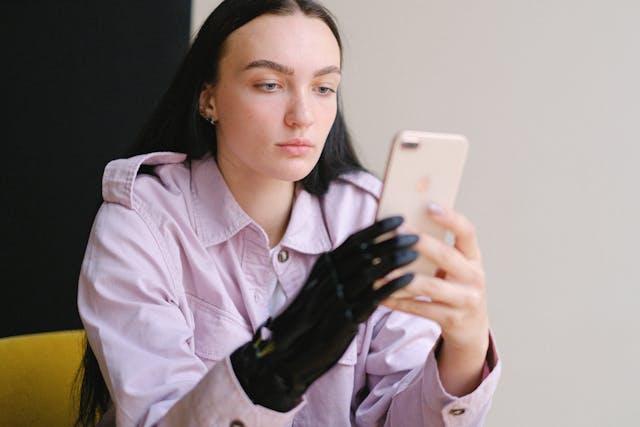Technology is evolving fast, and for people with disabilities, Artificial Intelligence (AI) is opening new doors to independence and convenience. AI-powered disability tech is no longer just about basic accessibility—it is now creating smart, adaptive solutions that help individuals navigate their daily lives with greater ease, confidence, and efficiency.
From AI-powered prosthetics that learn from movement to smart assistants that provide real-time guidance, the next five years will see a revolution in assistive technology. At Robobionics, we are committed to leveraging AI to enhance prosthetic function, rehabilitation, and everyday mobility. In this article, we explore how AI is transforming disability technology, making the world more inclusive and empowering than ever before.
1. AI-Powered Prosthetics: Smarter, More Responsive, and More Intuitive
Traditional prosthetic limbs rely on pre-set movements, but AI is making them smarter and more natural. Future AI-powered prosthetics will learn from user habits, detect movement patterns, and adapt in real-time for a seamless experience.
With machine learning algorithms, prosthetic hands, arms, and legs will be able to analyze muscle signals and adjust grip strength, step force, and balance automatically. This will allow users to perform everyday activities with less effort and greater precision. For example, an AI-enhanced prosthetic hand will adjust its grip strength depending on whether the user is holding a delicate object like an egg or a heavier item like a suitcase.
By 2030, AI will completely change how prosthetic limbs function, making them as close to natural limbs as possible. At Robobionics, we are working on AI-driven enhancements for Grippy™, ensuring that users experience effortless control and better adaptability in daily life.
2. Smart Assistants for the Visually Impaired: AI That Sees for You
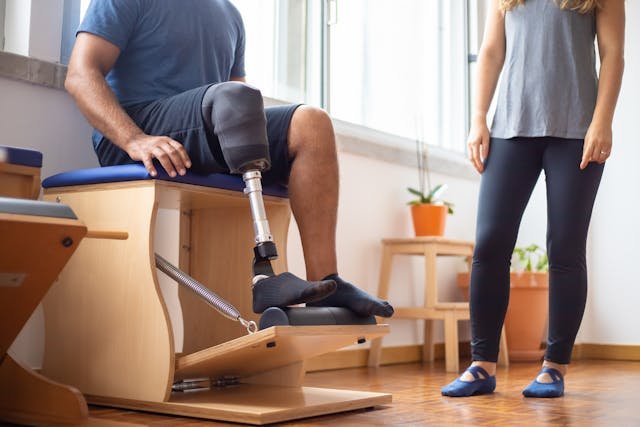
Navigating the world can be challenging for individuals with visual impairments, but AI-powered smart assistants are now providing real-time guidance and object recognition.
AI-driven smart glasses and mobile apps can now read text aloud, identify objects, and describe surroundings in real time. For example, an AI-powered camera mounted on glasses can recognize faces, read signs, and alert users about obstacles in their path, making mobility safer and more independent.
By 2030, these smart assistants will integrate advanced AI-based spatial mapping, allowing users to create mental maps of their surroundings. This will help them navigate public spaces, cross streets safely, and interact with digital content more efficiently.
3. AI-Powered Hearing Aids: Enhancing Sound and Speech Clarity
For individuals with hearing impairments, AI is making hearing aids smarter, clearer, and more adaptive to different environments.
Traditional hearing aids amplify all sounds equally, making it difficult to focus on specific conversations in noisy environments. AI-driven hearing aids will use advanced noise cancellation and real-time speech recognition to identify and enhance voices, ensuring better clarity even in crowded places.
By 2030, AI-powered language translation and real-time captions will be integrated into hearing aids, allowing users to understand different languages instantly. This will not only improve communication but also expand opportunities in education, travel, and the workplace.
4. AI in Wheelchairs: Smart Navigation and Obstacle Avoidance
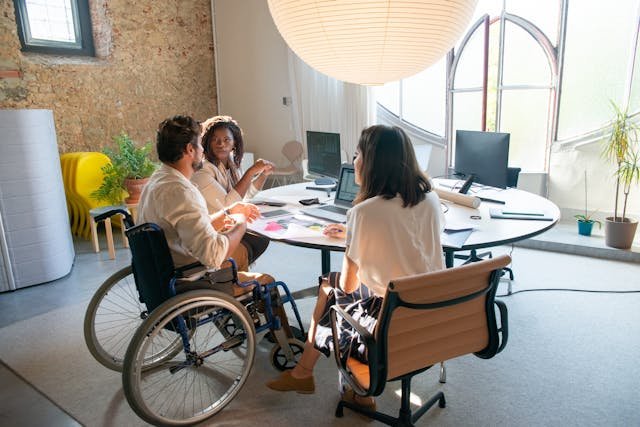
Smart wheelchairs equipped with AI-powered sensors and navigation systems are making movement more independent and effortless.
AI-driven wheelchairs can now detect terrain changes, avoid obstacles, and suggest optimized routes using machine learning and real-time mapping. Some models even integrate voice commands and facial recognition, allowing users to control their wheelchairs without physical effort.
By 2030, AI-powered wheelchairs will sync with smart city infrastructure, helping users find accessible pathways, enter buildings smoothly, and avoid crowded areas. These advancements will remove barriers to mobility, making public spaces truly inclusive.
5. AI in Speech and Communication Devices: Giving a Voice to All
For individuals with speech impairments, AI is revolutionizing communication through real-time text-to-speech and predictive language models.
AI-driven communication devices can now analyze facial expressions, eye movements, or neural signals to help users speak through digital voices. These systems are becoming faster, more accurate, and more personalized, ensuring that users can express themselves naturally.
By 2030, AI-powered communication devices will integrate emotion detection, allowing users to convey tone and intent, making digital speech more lifelike and engaging.
6. AI for Home Automation: Making Living Spaces Smarter
AI-powered smart home technology is making independent living easier for individuals with disabilities.
Voice-controlled smart home systems allow users to control lights, adjust temperatures, lock doors, and manage appliances without physical effort. AI-powered automation will also learn daily routines, automatically adjusting settings for maximum comfort and convenience.
By 2030, AI will enable fully autonomous home systems that can predict needs, provide reminders for medication, and even detect emergencies like falls or health issues, alerting caregivers or medical professionals in real-time.
7. AI-Enhanced Rehabilitation: Faster and More Effective Recovery
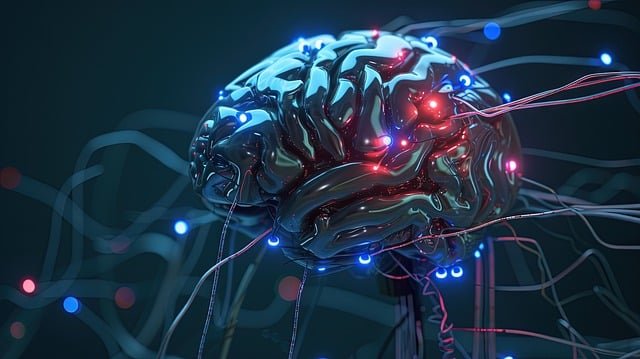
AI is transforming rehabilitation by making therapy more personalized, engaging, and data-driven.
AI-powered rehabilitation devices track muscle movement, strength progression, and recovery speed, adjusting therapy plans to match each user’s needs. These devices also gamify therapy exercises, keeping users motivated and engaged during recovery.
By 2030, AI-driven rehab will include virtual reality (VR) training environments, allowing users to practice real-world movements in a safe and controlled setting, speeding up adaptation to prosthetics and mobility aids.
8. AI for Emotional and Mental Well-Being
AI is not only improving physical accessibility but also supporting emotional and mental health.
AI-driven chatbots and virtual therapists are now helping individuals with disabilities manage stress, anxiety, and social isolation. These AI systems provide daily emotional support, mindfulness exercises, and crisis intervention when needed.
By 2030, AI-powered mental health assistants will become more advanced, recognizing emotional cues through speech and facial expressions, providing personalized recommendations for well-being and stress management.
9. AI and Wearable Health Monitoring: Proactive Healthcare for People with Disabilities
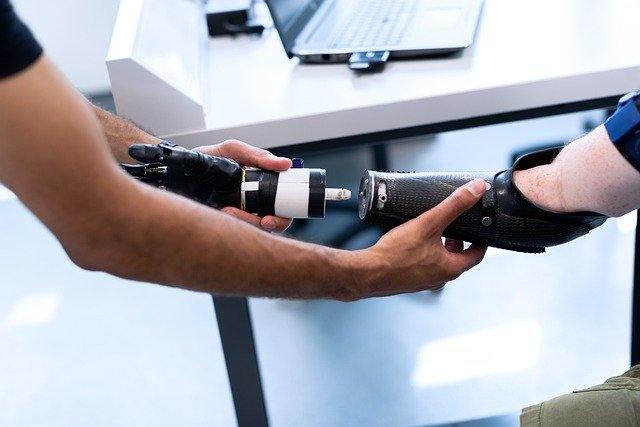
AI-powered wearables are tracking vital signs, movement, and overall health in real-time, allowing users and caregivers to detect potential health issues before they become serious.
Future AI wearables will monitor blood pressure, oxygen levels, hydration, and even mental stress, alerting users when medical attention is needed. These devices will be especially beneficial for individuals with mobility impairments, ensuring they stay healthy and active.
By 2030, AI wearables will integrate with smart prosthetics and mobility devices, providing a holistic approach to healthcare and well-being.
10. AI-Powered Navigation for Enhanced Mobility and Accessibility
For individuals with mobility challenges, navigating complex environments, public transport, and crowded areas can be difficult. AI-powered navigation tools are set to eliminate these challenges, offering real-time guidance, accessibility mapping, and voice-assisted directions.
Future AI-driven navigation apps will analyze a user’s mobility needs and provide customized routes that avoid obstacles like stairs, curbs, or inaccessible areas. These systems will integrate with smart cities, offering real-time updates on ramps, elevators, and wheelchair-friendly paths.
By 2030, AI will enable smart prosthetics and wheelchairs to connect directly to navigation apps, allowing users to receive automatic mobility adjustments and hands-free guidance, ensuring they move through any space with confidence and ease.
11. AI in Sports and Adaptive Athletics: Breaking Barriers for Athletes with Disabilities
AI is playing a key role in adaptive sports technology, helping athletes with disabilities optimize performance, prevent injuries, and improve training techniques.
Smart prosthetics with AI-driven movement analysis will fine-tune speed, balance, and pressure distribution, allowing paralympic and adaptive sports athletes to train more efficiently. AI-powered exoskeletons will also provide enhanced mobility and energy efficiency, making running, cycling, and extreme sports more accessible.
By 2030, AI-integrated prosthetics and assistive devices will sync with wearable motion sensors and VR-based training simulations, helping athletes analyze performance, track progress, and compete at an elite level.
12. AI in Personalized Education for Individuals with Disabilities

Education is becoming more inclusive thanks to AI-powered assistive learning tools that cater to students with disabilities. AI-driven speech-to-text systems, adaptive reading assistants, and real-time sign language translation are breaking barriers in classrooms and online education.
For students with learning disabilities, AI-powered platforms will adjust teaching methods, pacing, and content delivery based on individual needs, ensuring better comprehension and engagement.
By 2030, AI will power fully immersive virtual classrooms, where students with visual, hearing, or mobility impairments can interact, learn, and collaborate seamlessly. This will revolutionize education accessibility, ensuring equal learning opportunities for all.
13. AI-Integrated Smart Clothing for Individuals with Disabilities
Smart textiles and AI-powered clothing are emerging as a new frontier in assistive technology, providing real-time posture correction, muscle stimulation, and health monitoring.
Wearable AI-powered fabrics will analyze body movement and provide gentle muscle feedback to improve gait and posture, especially for prosthetic users and individuals with spinal injuries. Future AI-driven temperature-regulating smart clothes will ensure comfort in extreme weather conditions, helping individuals stay warm or cool as needed.
By 2030, AI-integrated adaptive clothing will be widely available, offering both functional benefits and enhanced mobility support, making daily life more comfortable and accessible.
14. AI for Independent Living: Smart Robotics for Everyday Assistance
AI-powered home robots are evolving to assist individuals with disabilities in daily tasks, making independent living more feasible and stress-free.
These smart robots will help with household chores, medication reminders, mobility assistance, and personal care tasks. Future AI-driven robotic arms and exoskeletons will provide enhanced physical support, helping individuals dress, cook, and manage personal hygiene independently.
By 2030, AI-powered home assistants will be deeply integrated with smart homes, ensuring personalized support tailored to individual needs, making independent living safer and more comfortable.
15. AI in Emotional and Social Support for Disability Inclusion
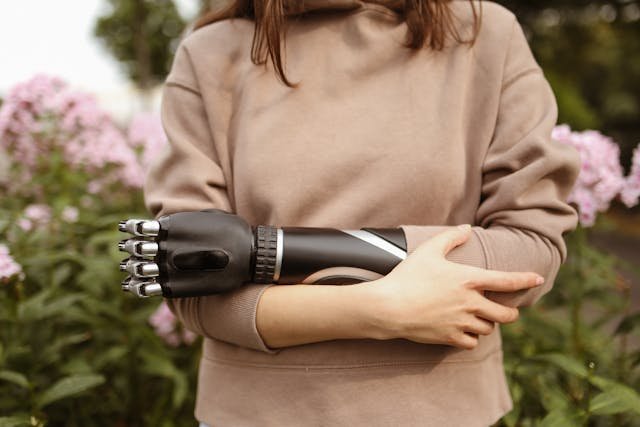
Social isolation is a common challenge for individuals with disabilities. AI-driven companion bots and virtual assistants are addressing this issue by providing daily companionship, mental wellness support, and social interaction tools.
Future AI companions will recognize emotions, provide motivational coaching, and encourage users to engage in social activities. These AI-powered systems will also assist in job training and employment matching, helping individuals with disabilities find suitable career opportunities based on skills and interests.
By 2030, AI-driven social integration tools will foster better inclusion, creating a more supportive, accessible, and connected world for individuals with disabilities.
16. AI-Driven Gesture Recognition: A New Era for Hands-Free Control
AI-powered gesture recognition technology is making it easier for individuals with disabilities to interact with devices, appliances, and smart assistants without relying on physical buttons or voice commands.
For individuals with limited mobility, AI-based cameras and sensors can detect hand, eye, or head movements, allowing users to control their prosthetics, computers, and household devices with simple gestures. This technology will provide greater independence by eliminating the need for manual controls.
By 2030, AI-driven gesture recognition will be integrated into smart homes, assistive robots, and wearable devices, making hands-free operation more seamless and accessible for everyone.
17. AI for Predictive Health Monitoring: Preventing Issues Before They Happen
AI-powered health monitoring is becoming a game-changer for individuals with disabilities, offering early detection of potential health risks and personalized care recommendations.
Smart prosthetics, wheelchairs, and wearables will be able to track vital signs, muscle activity, and mobility patterns, detecting early warning signs of infections, pressure sores, or joint strain. These AI systems will alert users and caregivers in real-time, preventing complications before they arise.
By 2030, AI-driven predictive healthcare solutions will ensure that individuals with disabilities receive proactive, personalized medical support, reducing hospital visits and improving overall well-being and longevity.
18. AI-Powered Adaptive Workspaces: Enabling Greater Employment Opportunities
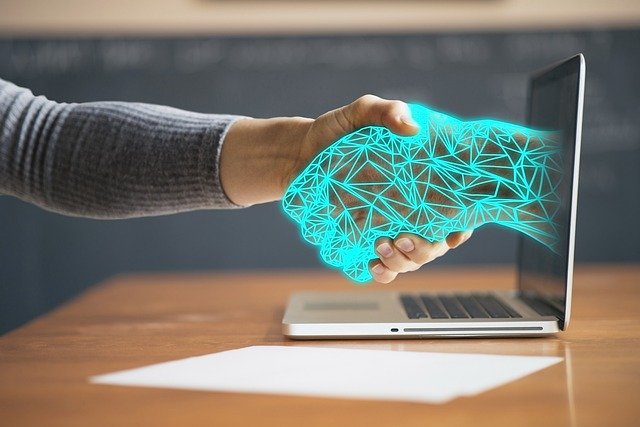
Finding and maintaining employment can be challenging for individuals with disabilities, but AI is creating more inclusive workplaces through adaptive workstations, virtual collaboration tools, and real-time accessibility adjustments.
AI-powered smart desks and ergonomic office setups will automatically adjust height, screen position, and lighting based on a user’s needs. Virtual AI assistants will provide speech-to-text transcription, real-time sign language interpretation, and cognitive support for individuals with learning disabilities.
By 2030, AI will help bridge the employment gap, ensuring that workplaces are fully accessible and optimized for productivity, empowering individuals with disabilities to excel in their careers without barriers.
19. AI-Powered Exoskeletons: Restoring Mobility for Those with Paralysis
AI-driven exoskeleton technology is giving individuals with spinal cord injuries and mobility impairments the ability to walk again.
Future AI-powered exoskeletons will use real-time muscle signal analysis and machine learning to adjust walking speed, balance, and weight distribution. These robotic suits will provide natural movement assistance, helping users regain strength, mobility, and independence.
By 2030, AI-driven exoskeletons will be more lightweight, affordable, and widely available, allowing individuals with severe mobility impairments to walk, climb stairs, and perform everyday activities with greater ease and confidence.
20. AI in Personalized Prosthetic Training: Smarter Learning, Faster Adaptation
Learning to use a prosthetic limb can be challenging, but AI-powered training systems are making the process easier, more personalized, and more engaging.
Future AI-driven rehabilitation programs will track muscle responses, movement patterns, and coordination, providing real-time feedback and customized training exercises. These programs will integrate virtual reality (VR) simulations, allowing users to practice in a safe and immersive environment.
By 2030, AI-powered home-based prosthetic training will be widely available, reducing the need for frequent clinic visits and allowing users to adapt to their prosthetics faster and with greater confidence.
Final Thoughts: AI Is Making the Future More Accessible
The intersection of AI and disability technology is creating a world where barriers to independence and accessibility are rapidly disappearing. From AI-powered prosthetics and smart wheelchairs to speech recognition, emotional support, and home automation, these innovations are transforming everyday life for millions of people.
At Robobionics, we are committed to integrating AI-driven advancements into our prosthetic solutions, ensuring that users experience the highest level of comfort, adaptability, and independence.
If you are looking for the future of prosthetic and assistive technology, book a free demo with Robobionics today and step into a world where AI-driven accessibility empowers you like never before!



